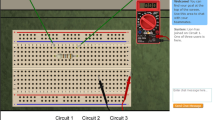Abstract
The study described in this paper investigated the metacognitive strategies used by a pair of senior secondary school students while working together on mechanics problems. Verbal protocols from think-aloud paired problem-solving sessions were analysed in order to examine the monitoring contributions of each individual student, and the significance of student-student interactions. Although the students were generally successful in coordinating their different, yet complementary, problem-solving roles, their metacognitive decision making was sometimes adversely affected by the social interaction between them. The findings suggest some potential benefits and pitfalls of using small group work for problem solving.
Similar content being viewed by others
References
Australian Education Council. (1991).A national statement on mathematics for Australian schools. Melbourne: Curriculum Corporation.
Board of Senior Secondary School Studies. (1992).Senior syllabus in Mathematics A. Brisbane: Author.
Brown, A. L., Bransford, J. D., Ferrara, R. A., & Campione, J. C.. (1983). Learning, remembering and understanding. In P. H. Mussen (Ed.),Handbook of child psychology, Vol. 3 (4th ed.) (pp. 77–166). New York: Wiley.
Ericsson, K. A., & Simon, H. A.. (1980). Verbal reports as data.Psychological Review, 87, 215–251.
Forman, E. (1989). The role of peer interaction in the social construction of mathematical knowledge.International Journal of Educational Research, 13, 55–70.
Garofalo, J., & Lester, F. K., Jr. (1985). Metacognition, cognitive monitoring, and mathematical performance.Journal for Research in Mathematics Education, 16, 163–176.
Genest, M., & Turk, D. (1981). Think-aloud approaches to cognitive assessment. In T. V. Merluzzi, C. R. Glass & M. Genest (Eds.),Cognitive assessment (pp. 233–269). New York: The Guilford Press.
Good, T. L., Mulryan, C., & McCaslin, M. (1992). Grouping for instruction in mathematics: A call for programmatic research on small-group processes. In D. A. Grouws (Ed.),Handbook of research on mathematics teaching and learning (pp. 165–196). New York: Macmillan.
Kroll, D. L.. (1988). Cooperative problem solving and metacognition: A case study of three pairs of women.Dissertation Abstracts International, 49, 2958 A. (University Microfilms No. 8902580).
Lester, F. K., Jr., Garafolo, J., & Kroll, D. (1989).The role of metacognition in mathematical problem solving: A study of two grade seven classes (Final Report). Bloomington, IN: Indiana University, Mathematics Education Development Centre (ED 314 255).
Nisbett, R. E. & Wilson, T. D.. (1977). Telling more than we can know: Verbal reports on mental processes.Psychological Review, 84, 231–259.
Schoenfeld, A. H.. (1983). Beyond the purely cognitive: Belief systems, social cognitions, and metacognitions as driving forces in intellectual performance.Cognitive Science, 7, 329–363.
Schoenfeld, A. H.. (1985a).Mathematical problem solving. Orlando, FA: Academic Press.
Schoenfeld, A. H.. (1985b). Making sense out of “out loud” problem-solving protocols.Journal of Mathematical Behavior, 4, 171–191.
Schoenfeld, A. H.. (1987). What’s all the fuss about metacognition? In A. H. Schoenfeld (Ed.),Cognitive science and mathematics education (pp. 189–215). Hillsdale, NJ: Erlbaum.
Silver, E. A.. (1982). Knowledge organisation and mathematical problem solving. In F. K. Lester, Jr. & J. Garofalo (Eds.),Mathematical problem solving: Issues in research (pp. 15–25). Philadelphia: The Franklin Institute Press.
Venezky, R. L., & Bregar, W. S.. (1988). Different levels of ability in solving mathematical word problems.Journal of Mathematical Behavior, 7, 111–134.
Author information
Authors and Affiliations
Rights and permissions
About this article
Cite this article
Goos, M. Metacognitive decision making and social interactions during paired problem solving. Math Ed Res J 6, 144–165 (1994). https://doi.org/10.1007/BF03217269
Issue Date:
DOI: https://doi.org/10.1007/BF03217269




